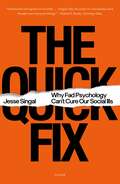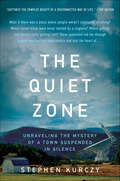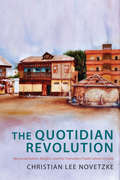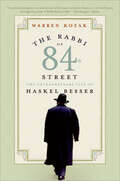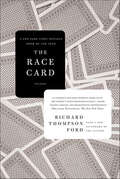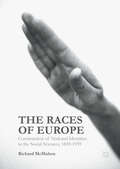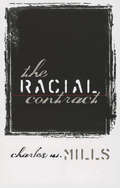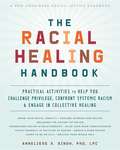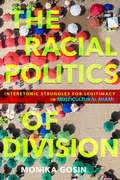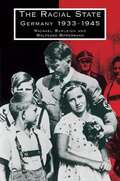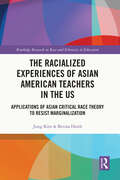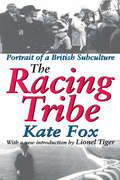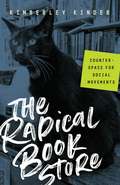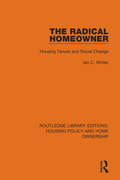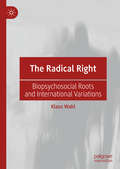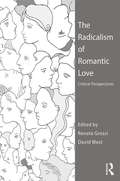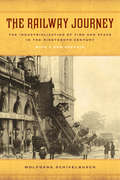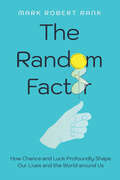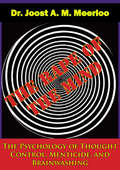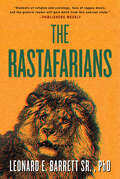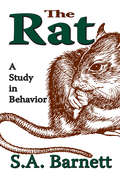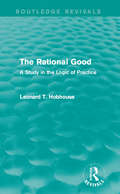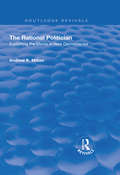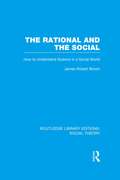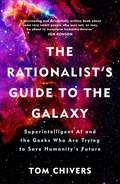- Table View
- List View
The Quick Fix: Why Fad Psychology Can't Cure Our Social Ills
by Jesse SingalAn investigative journalist exposes the many holes in today’s bestselling behavioral science, and argues that the trendy, TED-Talk-friendly psychological interventions that are so in vogue at the moment will never be enough to truly address social injustice and inequality.With their viral TED talks, bestselling books, and counter-intuitive remedies for complicated problems, psychologists and other social scientists have become the reigning thinkers of our time. Grit and “power posing” promised to help overcome entrenched inequalities in schools and the workplace; the Army spent hundreds of millions of dollars on a positive psychology intervention geared at preventing PTSD in its combat soldiers; and the implicit association test swept the nation on the strength of the claim that it can reveal unconscious biases and reduce racism in police departments and human resources departments. But what if much of the science underlying these blockbuster ideas is dubious or fallacious? What if Americans’ longstanding preference for simplistic self-help platitudes is exerting a pernicious influence on the way behavioral science is communicated and even funded, leading respected academics and the media astray? In The Quick Fix, Jesse Singal examines the most influential ideas of recent decades and the shaky science that supports them. He begins with the California legislator who introduced self-esteem into classrooms around the country in the 1980s and the Princeton political scientist who warned of an epidemic of youthful “superpredators” in the 1990s. In both cases, a much-touted idea had little basis in reality, but had a massive impact. Turning toward the explosive popularity of 21st-century social psychology, Singal examines the misleading appeal of entertaining lab results and critiques the idea that subtle unconscious cues shape our behavior. As he shows, today’s popular behavioral science emphasizes repairing, improving, and optimizing individuals rather than truly understanding and confronting the larger structural forces that drive social ills. Like Anand Giridharadas’s Winners Take All, The Quick Fix is a fresh and powerful indictment of the thought leaders and influencers who cut corners as they sell the public half-baked solutions to problems that deserve more serious treatment.
The Quiet Zone: Unraveling the Mystery of a Town Suspended in Silence
by Stephen KurczyIn this riveting account of an area of Appalachia known as the Quiet Zone where cell phones and WiFi are banned, journalist Stephen Kurczy explores the pervasive role of technology in our lives and the innate human need for quiet.“Captures the complex beauty of a disconnected way of life.” —The NationWith a new afterword to the paperback editionDeep in the Appalachian Mountains lies the last truly quiet town in America. Green Bank, West Virginia, is a place at once futuristic and old-fashioned: It’s home to the Green Bank Observatory, where astronomers search the depths of the universe using the latest technology, while schoolchildren go without WiFi or iPads. With a ban on all devices emanating radio frequencies that might interfere with the observatory’s telescopes, Quiet Zone residents live a life free from constant digital connectivity. But a community that on the surface seems idyllic is a place of contradictions, where the provincial meets the seemingly supernatural and quiet can serve as a cover for something darker.Stephen Kurczy embedded in Green Bank, making the residents of this small Appalachian village his neighbors. He shopped at the town’s general store, attended church services, went target shooting with a seven-year-old, square-danced with the locals, sampled the local moonshine. In The Quiet Zone, he introduces us to an unforgettable cast of characters. There is a tech buster patrolling the area for illegal radio waves; “electrosensitives” who claim that WiFi is deadly; a sheriff’s department with a string of unsolved murder cases dating back decades; a camp of neo-Nazis plotting their resurgence from a nearby mountain hollow. Amongst them all are the ordinary citizens seeking a simpler way of living. Kurczy asks: Is a less connected life desirable? Is it even possible?The Quiet Zone is a remarkable work of investigative journalism—at once a stirring ode to place, a tautly wound tale of mystery, and a clarion call to reexamine the role technology plays in our lives.
The Quotidian Revolution: Vernacularization, Religion, and the Premodern Public Sphere in India
by Christian Lee NovetzkeIn thirteenth-century Maharashtra, a new vernacular literature emerged to challenge the hegemony of Sanskrit, a language largely restricted to men of high caste. In a vivid and accessible idiom, this new Marathi literature inaugurated a public debate over the ethics of social difference grounded in the idiom of everyday life. The arguments of vernacular intellectuals pushed the question of social inclusion into ever-wider social realms, spearheading the development of a nascent premodern public sphere that valorized the quotidian world in sociopolitical terms.The Quotidian Revolution examines this pivotal moment of vernacularization in Indian literature, religion, and public life by investigating courtly donative Marathi inscriptions alongside the first extant texts of Marathi literature: the Lilacaritra (1278) and the Jñanesvari (1290). Novetzke revisits the influence of Chakradhar (c. 1194), the founder of the Mahanubhav religion, and Jnandev (c. 1271), who became a major figure of the Varkari religion, to observe how these avant-garde and worldly elites pursued a radical intervention into the social questions and ethics of the age. Drawing on political anthropology and contemporary theories of social justice, religion, and the public sphere, The Quotidian Revolution explores the specific circumstances of this new discourse oriented around everyday life and its lasting legacy: widening the space of public debate in a way that presages key aspects of Indian modernity and democracy.
The Rabbi of 84th Street: The Extraordinary Life of Haskel Besser
by Warren KozakAlways wearing an easy smile, Hasidic rabbi Haskel Besser spreads joy wherever he goes, enriching the lives of his many friends and congregants with his profound understanding of both Orthodox Judaism and humannature.With warmth and admiration, journalist Warren Kozak writes about the rabbi's extraordinary life—from his family's escape to Palestine in the late 1930s to his witnessing of Israel's rebirth in 1948, to his move to New York City, where he lives today.A rare window into the normally closed world of Hasidic Jews, The Rabbi of 84th Street is also the story of Judaism in the twentieth century; of the importance of centuries-old traditions; and of the triumph of faith, kindness, and spirit.
The Race Card: How Bluffing About Bias Makes Race Relations Worse
by Richard Thompson FordA New York Times Notable Book of the YearWhat do hurricane Katrina victims, millionaire rappers buying vintage champagne, and Ivy League professors waiting for taxis have in common? All have claimed to be victims of racism. But these days almost no one openly defends bigoted motives, so either a lot of people are lying about their true beliefs, or a lot of people are jumping to unwarranted conclusions--or just playing the race card. Daring, entertaining, and incisive, The Race Card brings sophisticated legal analysis, eye-popping anecdotes, and plain old common sense to this heated topic.
The Races of Europe
by Richard McmahonThis book explores a vital but neglected chapter in the histories of nationalism, racism and science. It is the first comprehensive study of the transnational scientific community that in the nineteenth and early twentieth centuries attempted to classify Europe's biological races. Anthropological race classifiers produced parallel geographies, histories and hierarchies of European peoples that were crucial to the creation of national identities and to the overtly political race discourses of eugenics and popular racist ideologues. They lent nationalism the invaluable prestige of natural science, and traced the histories, conflicts and relationships of 'national races' back into prehistory. Racial national character stereotypes meanwhile supported competing political ideologies. The book examines the interplay between class, gender and national identity narratives and the tensions and interactions between the scientific and political agendas of classifiers. Within the elaborate transnational networks of scientific communities, for example, they had to reconcile competing national narratives.
The Racial Contract
by Charles W. MillsThe Racial Contract puts classic Western social contract theory, deadpan, to extraordinary radical use. With a sweeping look at the European expansionism and racism of the last five hundred years, Charles W. Mills demonstrates how this peculiar and unacknowledged "contract" has shaped a system of global European domination: how it brings into existence "whites" and "non-whites," full persons and sub-persons, how it influences white moral theory and moral psychology; and how this system is imposed on non-whites through ideological conditioning and violence. The Racial Contract argues that the society we live in is a continuing white supremacist state. Holding up a mirror to mainstream philosophy, this provocative book explains the evolving outline of the racial contract from the time of the New World conquest and subsequent colonialism to the written slavery contract, to the "separate but equal" system of segregation in the twentieth-century United States. According to Mills, the contract has provided the theoretical architecture justifying an entire history of European atrocity against non-whites, from David Hume's and Immanuel Kant's claims that blacks had inferior cognitive power, to the Holocaust, to the kind of imperialism in Asia that was demonstrated by the Vietnam War. Mills suggests that the ghettoization of philosophical work on race is no accident. This work challenges the assumption that mainstream theory is itself raceless. Just as feminist theory has revealed orthodox political philosophy's invisible white male bias, Mills's explication of the racial contract exposes its racial underpinnings.
The Racial Healing Handbook: Practical Activities To Help You Challenge Privilege, Confront Systemic Racism, And Engage In Collective Healing (Social Justice Handbook)
by Anneliese A. SinghThe Racial Healing Handbook offers practical tools to help navigate daily and past experiences of racism, challenge internalized negative messages and privileges and handle feelings of stress and shame. It also helps learn to develop a profound racial consciousness and conscientiousness and heal from grief and trauma. Most importantly, it helps discover the building blocks to creating a community of healing in a world still filled with racial microaggressions and discrimination. This book is not just about ending racial harm--it is about racial liberation. It promises the possibility of moving through this pain and grief to experience the hope, resilience and freedom that helps not only self-actualize, but also makes the world a better place.
The Racial Politics of Division: Interethnic Struggles for Legitimacy in Multicultural Miami
by Monika GosinThe Racial Politics of Division deconstructs antagonistic discourses that circulated in local Miami media between African Americans, "white" Cubans, and "black" Cubans during the 1980 Mariel Boatlift and the 1994 Balsero Crisis. Monika Gosin challenges exclusionary arguments pitting these groups against one another and depicts instead the nuanced ways in which identities have been constructed, negotiated, rejected, and reclaimed in the context of Miami's historical multiethnic tensions. Focusing on ideas of "legitimacy," Gosin argues that dominant race-making ideologies of the white establishment regarding "worthy citizenship" and national belonging shape inter-minority conflict as groups negotiate their precarious positioning within the nation. Rejecting oversimplified and divisive racial politics, The Racial Politics of Division portrays the lived experiences of African Americans, white Cubans, and Afro-Cubans as disrupters in the binary frames of worth-citizenship narratives. Foregrounding the oft-neglected voices of Afro-Cubans, Gosin posits new narratives regarding racial positioning and notions of solidarity in Miami. By looking back to interethnic conflict that foreshadowed current demographic and social trends, she provides us with lessons for current debates surrounding immigration, interethnic relations, and national belonging. Gosin also shows us that despite these new demographic realities, white racial power continues to reproduce itself by requiring complicity of racialized groups in exchange for a tenuous claim on US citizenship.
The Racial State: Germany 1933-1945
by Michael Burleigh Wolfgang WippermannBetween 1933 and 1945 the Nazi regime in Germany tried to restructure a "class" society along racial lines. This book deals with the ideas and institutions that underpinned this mission, and shows how Nazi policy affected various groups of people, both victims and beneficiaries. The book begins with a serious discussion of the origins of Nazi racial ideology, and then demonstrates the way in which this was translated into official policy. It deals with the systematic persecution not only of the Jews, but also with the fate of lesser-known groups such as Sinti and Roma, the mentally handicapped, the "asocial," and homosexuals.
The Racialized Experiences of Asian American Teachers in the US: Applications of Asian Critical Race Theory to Resist Marginalization (Routledge Research in Race and Ethnicity in Education)
by Jung Kim Betina HsiehDrawing on in-depth interviews, this text examines how Asian American teachers in the US have adapted, persisted, and resisted racial stereotyping and systematic marginalization throughout their educational and professional pathways. Utilizing critical perspectives combined with tenets of Asian Critical Race Theory, Kim and Hsieh structure their findings through chapters focused on issues relating to anti-essentialism, intersectionality, and the broader social and historical positioning of Asians in the US. Applying a critical theoretical lens to the study of Asian American teachers demonstrates the importance of this framework in understanding educators’ experiences during schooling, training, and teaching, and in doing so, the book highlights the need to ensure visibility for a community so often overlooked as a "model minority", and yet one of the fastest growing racial groups in the US. This text will benefit researchers, academics, and educators with an interest in the sociology of education, multicultural education, and teachers and teacher education more broadly. Those specifically interested in Asian American history and the study of race and ethics within Asian studies will also benefit from this book.
The Racing Tribe: Portrait of a British Subculture
by Kate FoxIt is generally assumed that anthropologists do their research in remote and uncomfortable parts of the world--places with monsoons, mud huts, and malaria. In this volume, social anthropologist Kate Fox has taken on an altogether more enjoyable assignment, the study of the arcane world of British horseracing. For Fox, field research meant wandering around racetracks in a pink hat and high heels (standard tribal costume) rather than braving killer insects and primitive sanitation. Instead of an amorphous racing crowd, the author finds a complete subculture with its own distinctive customs, rituals, language and etiquette. Among the spectators, she identifies Horseys, Addicts, Anoraks, Pair-Bonders, Day-Outers, Suits, and Be-Seens--all united by remarkable friendliness and courtesy. Among the racing professionals, the tribal structure includes Warriors (jockeys), Shamans (trainers), Scribes (journalists), Elders (officials and stewards) and Sin-Eaters (bookies). Fox includes witty and incisive descriptions of the many strange ceremonies and rituals observed by racegoers--the Circuit Ritual, Ritual Conversations ("What do you fancy in the next?") , Celebration Rituals, the Catwalk Ritual, and Post-Mortem Rituals (naturally, a horse never loses a race because it's too slow)--and their special codes of behavior such as the Modesty Rule, the Collective Amnesia Rule, and the Code of Chivalry. The Racing Tribe is also a refreshingly candid account of anthropological fieldwork, including all the embarrassing mistakes, hiccups, short-cuts and guesswork that most social scientists keep very quiet about.
The Radical Bookstore: Counterspace for Social Movements
by Kimberley KinderExamines how radical bookstores and similar spaces serve as launching pads for social movements How does social change happen? It requires an identified problem, an impassioned and committed group, a catalyst, and a plan. In this deeply researched consideration of seventy-seven stores and establishments, Kimberley Kinder argues that activists also need autonomous space for organizing, and that these spaces are made, not found. She explores the remarkably enduring presence of radical bookstores in America and how they provide infrastructure for organizing—gathering places, retail offerings that draw new people into what she calls &“counterspaces.&”Kinder focuses on brick-and-mortar venues where owners approach their businesses primarily as social movement tools. These may be bookstores, infoshops, libraries, knowledge cafes, community centers, publishing collectives, thrift stores, or art installations. They are run by activist-entrepreneurs who create centers for organizing and selling books to pay the rent. These spaces allow radical and contentious ideas to be explored and percolate through to actual social movements, and serve as crucibles for activists to challenge capitalism, imperialism, white privilege, patriarchy, and homophobia. They also exist within a central paradox: participating in the marketplace creates tensions, contradictions, and shortfalls. Activist retail does not end capitalism; collective ownership does not enable a retreat from civic requirements like zoning; and donations, no matter how generous, do not offset the enormous power of corporations and governments. In this timely and relevant book, Kinder presents a necessary, novel, and apt analysis of the role these retail spaces play in radical organizing, one that demonstrates how such durable hubs manage to persist, often for decades, between the spikes of public protest.
The Radical Homeowner: Housing Tenure and Social Change
by Ian C. WinterOriginally published in 1994, this book provides an important contribution to contemporary housing debates as well as clear examples of the use of qualitative data in causal analysis. Based on 3 original Australian case studies and a range of international data, this book demonstrates that the interests and meanings of home ownership can lead home owners into radical courses of social action that oppose the status quo, despite national governments having sponsored a remarkable growth in home ownership to promote a loyal citizenship and political stability.
The Radical Right: Biopsychosocial Roots and International Variations
by Klaus WahlThis book analyses the rise in xenophobia, racism, and radical right political parties, movements, and violent groups over recent years. The author provides a summary of the current state of international and interdisciplinary research on the multilevel explanations of right-wing radical thought, comparing similarities and differences across Europe and the United States. By integrating findings from psychology, history, social and life sciences, he proposes a biopsychosociological model of the conditions, causes, catalysts, and triggers of phenomena of the radical right across the world. Following a ‘demand’ and ‘supply’ analysis, Wahl explores the interaction of evolutionary emotional mechanisms and socialization processes with various environmental conditions, and consequent manifestations of radical right groups, to identify strategies to slow down the rise and effects of the radical right.
The Radicalism of Romantic Love: Critical Perspectives
by David West Renata GrossiUndoubtedly Romantic love has come to saturate our culture and is often considered to be a, or even the, major existential goal of our lives, capable of providing us with both our sense of worth and way of being in the world. The Radicalism of Romantic Love interrogates the purported radicalism of Romantic love from philosophical, cultural and psychoanalytic perspectives, exploring whether it is a subversive force capable of breaking down entrenched social, political and cultural norms and structures, or whether, in spite of its role in the fight against certain barriers, it is in fact a highly conservative impulse. Exploring both the grounds for the central place of Romantic love in contemporary lives and the meaning, extent and nature of its supposed radicalism, this volume considers love from a variety of theoretical perspectives, with attention to matters of gender, sexuality, class and ethnicity. With authors examining a range of questions, including the role of love in the same-sex marriage debate, polyamory and the notion of love as a political force, The Radicalism of Romantic Love illuminates a fundamental but perplexing aspect of our contemporary lives and will appeal to scholars across the social sciences and humanities with interests in the emotions and love as a social and political phenomenon.
The Railway Journey
by Wolfgang SchivelbuschThe impact of constant technological change upon our perception of the world is so pervasive as to have become a commonplace of modern society. But this was not always the case; as Wolfgang Schivelbusch points out in this fascinating study, our adaptation to technological change--the development of our modern, industrialized consciousness--was very much a learned behavior. In The Railway Journey, Schivelbusch examines the origins of this industrialized consciousness by exploring the reaction in the nineteenth century to the first dramatic avatar of technological change, the railroad. In a highly original and engaging fashion, Schivelbusch discusses the ways in which our perceptions of distance, time, autonomy, speed, and risk were altered by railway travel. As a history of the surprising ways in which technology and culture interact, this book covers a wide range of topics, including the changing perception of landscapes, the death of conversation while traveling, the problematic nature of the railway compartment, the space of glass architecture, the pathology of the railway journey, industrial fatigue and the history of shock, and the railroad and the city. Belonging to a distinguished European tradition of critical sociology best exemplified by the work of Georg Simmel and Walter Benjamin, The Railway Journey is anchored in rich empirical data and full of striking insights about railway travel, the industrial revolution, and technological change. Now updated with a new preface, The Railway Journey is an invaluable resource for readers interested in nineteenth-century culture and technology and the prehistory of modern media and digitalization.
The Random Factor: How Chance and Luck Profoundly Shape Our Lives and the World around Us
by Prof. Mark Robert RankUpending notions of predictability and rugged individualism to reveal how truly random the world is. It’s comforting to think that we can be successful because we work hard, climb ladders, and get what we deserve, but each of us has been profoundly touched by randomness. Chance is shown to play a crucial role in shaping outcomes across history, throughout the natural world, and in our everyday lives. In The Random Factor, Mark Robert Rank draws from a wealth of evidence, including interviews and research, to explain how luck and chance play out and reveals how we can use these lessons to guide our personal lives and public policies. The Random Factor traverses luck from macro to micro, from events like the Cuban Missile Crisis to our personal encounters and relationships. From his perspective as a scholar of poverty, Rank also delves into the class and race dynamics of chance, emphasizing the stark disparities it brings to light. This transformative book prompts a new understanding of the twists and turns in our daily lives and encourages readers to fully appreciate the surprising world of randomness in which we live.
The Rape of the Mind: The Psychology Of Thought Control, Menticide, And Brainwashing
by Dr Joost A. M. Meerloo"SINCE 1933, when a completely drugged and trial-conditioned human wreck confessed to having started the Reichstag fire in Berlin, Dr. Joost A. M. Meerloo has studied the methods by which systematic mental pressure brings people to abject submission, and by which totalitarians imprint their subjective "truth" on their victims' minds. The first two and one-half years of WWII, Dr. Meerloo spent under the pressure of Nazi-occupied Holland, witnessing at first-hand the Nazi methods of mental torture on more than one occasion...Then, after personal experiences with enforced interrogation, he escaped from a Nazi prison and certain death to England, where he was able, as Chief of the Psychological Department of the Netherlands Forces, to observe and study coercive methods officially....After the war, he came to the United States...As more and more cases of thought control, brainwashing, and mental coercion were disclosed - Cardinal Mindszenty, Colonel Schwable, Robert Vogeler, and others - his interest grew. It was Dr. Meerloo who coined the word menticide, the killing of the spirit, for this peculiar crime...It is Dr. Meerloo's position that through pressure on the weak points in men's makeup, totalitarian methods can turn anyone into a "traitor." And in The Rape of the Mind he goes far beyond the direct military implications of mental torture to describing how our own culture unobtrusively shows symptoms of pressurizing people's minds. He presents a systematic analysis of the methods of brainwashing and mental torture and coercion, and shows how totalitarian strategy, with its use of mass psychology, leads to systematized "rape of the mind." He describes the new age of cold war with its mental terror, verbocracy, and semantic fog, the use of fear as a tool of mass submission and the problem of treason and loyalty, so loaded with dangerous confusion. The Rape of the Mind is written for the interested layman, not only for experts and scientists."-Print ed.
The Rastafarians: Twentieth Anniversary Edition
by Leonard E. Barrett Leonard BarrettThe classic work on the history and beliefs of the Rastafarians, whose roots of protest go back to the seventeenth-century maroon societies of escaped slaves in Jamaica. Based on an extensive study of the Rastafarians, their history, their ideology, and their influence in Jamaica, The Rastafarians is an important contribution to the sociology of religion and to our knowledge of the variety of religious expressions that have grown up during the West African Diaspora in the Western Hemisphere.
The Rat: A Study in Behavior
by S. A. BarnettThe laws of animal behavior have been revised and revealed through research performed by zoologists, physiologists and experimental psychologists. Each has contributed much. Their main meeting ground has been the study of mammals, especially rats. This classic book is unique in bringing together the principal conclusions of these researchers in a compact, well illustrated, and lucid form.The author himself made important original contributions to wild rat behavior; his account of "white rat psychology" and of relevant work on other species is equally authoritative. Experience as a teacher enabled him to write an unusually logical and comprehensive text, suitable for students of zoology, psychology and medicine.This book belongs to no particular school of biology or psychology. Rather it admits the work of all schools and strict adherence to none. The principal topics covered include: movement in the living space; feeding behavior; social and reproductive behavior; the analysis of "instinct"; the analysis of learned behavior; "motivation" and "drive"; the brain and behavior. The book includes a full, carefully selected bibliography, current up to the time of original publication of the original edition.
The Rational Good: A Study in the Logic of Practice (Routledge Revivals)
by Leonard T. HobhouseFirst published in 1921, this book explores the function of Reason in practical life. It considers whether there is a Rational, demonstrable, standard of values to which the actions of man and the institutions of society may be referred for judgement, and to what authority and power does it possess to influence the actual conduct of men and society.
The Rational Politician: Exploiting the Media in New Democracies (Routledge Revivals)
by Andrew K MiltonThis title was first published in 2000: An examination of the way in which post-communist political actors have persisted in exploiting, controlling and manipulating the media, in spite of rhetorical commitments to freer and more independent media.
The Rational and the Social: How to Understand Science in a Social World (Routledge Library Editions: Social Theory)
by James Robert BrownTo paraphrase Marx, sociologists have only interpreted science; the point is to improve it. The Rational and the Social attempts both. It begins by sketching recent sociological approaches to science, notably the strong programme – Bloor’s ‘science of science’ and Barnes’s ‘finitism’ – and that of the ‘anthropologists in the lab’, Collins and Latour and Woolgar. The author argues that although sociological accounts are valuable in many respects, when morals are drawn about the structure and epistemology of science, they are badly flawed. In rejecting the sociological theory of science, it is not necessary to conclude that science develops without reference to the social. James Robert Brown argues for an alternative account. He proposes a novel way of viewing the history of science as a source of evidence for how to do good science and argues that the most important aspect of methodology is that it is comparative. Rival theories are evaluated by comparison and the contribution of the social to this process is inevitable and should be acknowledged. This is the challenge to science.
The Rationalist's Guide to the Galaxy: Superintelligent AI and the Geeks Who Are Trying to Save Humanity's Future
by Tom Chivers'A fascinating and delightfully written book about some very smart people who may not, or may, be about to transform humanity forever' JON RONSON'Beautifully written, and with wonderful humour, this is a thrilling adventure story of our own future' LEWIS DARTNELL, author of THE KNOWLEDGE and ORIGINSAre paperclips going to destroy life as we know it?What can Mickey Mouse teach us about how to programme AI?Could a more rational approach to life be what saves us all?This is a book about about a community of people who are trying to think rationally about intelligence and what insight they can and can't give us about the future of the human race. It explains why these people are worried about an AI apocalypse, why they might be right, and why they might be wrong. It is a book about the cutting edge of our thinking on intelligence and rationality right now by the people who stay up all night worrying about it.
